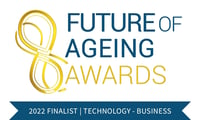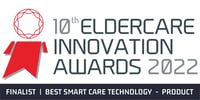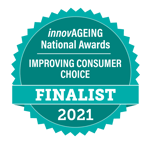
In this case study, CEO Lucy O'Flaherty, a highly esteemed professional in the Aged Care industry, known for winning numerous accolades such as National Not-For-Profit Leader of the Year and Telstra Tasmanian Business Woman of the Year (2019), offers valuable insights into her journey of modernising and enhancing the operations of Columbia Aged Care.
She details the successful integration of Person Centred Software’s Clinical Care System (mCare) into their workflow and the impact it has had on their operations.
Upon arriving at Columbia Aged Care, one of my main focuses was ensuring that accurate and timely information was available to all who required it. At the time, we faced inconsistencies and variable data entry practices, largely due to the previous clinical system we had in place.
This system mandated that any progress notes be manually typed, necessitating a high level of English literacy and grammar proficiency from staff. This then posed challenges in conveying interventions and care details effectively.
I also discovered that we were using an outdated version of our previous system, which resulted in non-compliance due to the inability to capture essential information required for reporting.
Moving forward, addressing these challenges and streamlining our data entry processes were top priorities for Columbia Aged Care which prompted a swift decision to transition to Person Centred Software’s Clinical Care System (mCare).
Although the implementation of mCare came with a new cost, it was a one-time investment. As I was already familiar with implementing mCare at a previous organisation, it made it an easy decision.
Because of the diverse workforce at our facilities, representing various cultural and language backgrounds the utilisation of iconography and images within mCare resonated well with our staff, leading to a remarkable 700% increase in the documentation and evidence of care delivery.
It was encouraging to see our frontline staff exhibit great enthusiasm for the new system, embracing its user-friendly interface. However, for nursing staff, the transition required a shift in thinking as they approached data entry differently, posing a learning curve that is still being navigated two years later. As with any implementation of new technologies, the change in our work processes combined with typical staff changes, has required a period of adaptation. But we can always count on the Person Centred Software team to support us with information and training sessions to bring us all up to speed.
Enhanced Visibility
From a corporate standpoint, mCare has significantly improved our ability to respond to concerns and compliance, in a timely way, providing me with the capability to quickly address family inquiries and follow a resident's care journey, despite not being a clinician.
The clinical care system has significantly enhanced my ability to address concerns raised by families and individuals. By providing quick access to detailed care records, I can efficiently verify information and resolve inquiries promptly. This has been instrumental in clarifying situations where care may have been misunderstood, such as discrepancies in personal hygiene routines. As a result, it has improved my ability to support residents and families and provide swift responses, without having to rely on staff to investigate and get back to me.
Increased Resident Safety
By leveraging mCare, we've significantly enhanced our data collection on fall incidents, including time, location, and frequency. This granular data has proven invaluable in informing our investment strategy for sensor and predictive technologies. Moreover, identifying specific areas with higher fall occurrence rates has allowed us to strategically deploy IoT sensors, optimising resource allocation and elevating resident safety.
Time Saved
The move from desk-based computers to mobile devices for point-of-care documentation has been instrumental in freeing up nurse stations and encouraging staff to be more present on the floor. With mobile devices, staff can input data in real-time, avoiding the previous practice of carrying notepads and pens to record observations and then hastily transcribing them at the end of a shift. This transition has saved considerable time, allowing staff to focus more on providing quality care and reducing the administrative burden of documentation.
Informed Decision-Making
Our Corporate Services team, encompassing HR, finance, quality, and other specialised areas, have expressed that mCare provides a more comprehensive view of the facility, offering insights beyond individual cases. By analysing reports generated from the system, we can identify trends within the resident population, anticipate health trajectories, and better tailor staff training programs to meet emerging needs.
The system serves as a valuable reference point for our finance team, enabling them to cross-reference move-in dates with Medicare claims and other financial data efficiently. This functionality enhances our planning processes and oversight capabilities. Not only does it save time and streamline operations at the front of the house, but it also seamlessly integrates with our existing systems like our Electronic Medication Management System - BestMed, providing additional benefits and improving overall efficiency.
There will be changes coming our way with the new Age Care Act, expected to take effect in July 2025. Whenever there is a change in the aged care sector, it tends to be quite significant, so many of us are striving to stay ahead of the curve. One of the changes taking place in the next few months is offering Monthly Care Statements voluntarily from October 2024, which will be mandatory at some point.
These statements are for the benefit of the residents and their representatives, to inform them of the care being provided. These statements will need to encompass details such as the resident's change in health or care, and any other relevant events that occurred in the previous period. This could involve information about falls, wound care, referrals to specialists, changes in medication, activity levels, alterations in mobility, and weight changes etc.
With that, the upcoming priority for us is to start generating Monthly Care Statements for our residents and their families. I am genuinely looking forward to seeing the potential time-saving benefits mCare could offer by enabling quick and easy access to information from the clinical care system to inform these monthly care statements.
As a huge advocate of Person Centred Software - having already brought mCare into two aged care organisations now, implementing Person Centred Software's Clinical Care System has ultimately improved our overall documentation (an increase of 700%) and tracking, leading to quicker response times and enhanced safety measures for our residents!
Book a demo with us today
Find out why our solutions are used by thousands of aged care & retirement living providers globally




